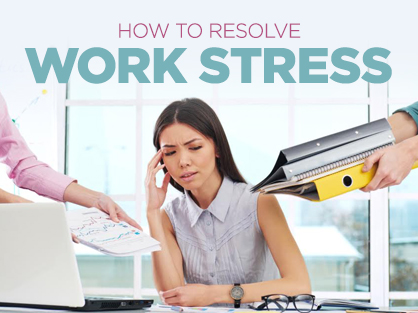Learn How to Relieve Work-Related Stress
Set boundaries and others will respect you for it
Work-related stress is one of the biggest contributors to unhappiness in the workplace. Learning to set boundaries and reducing work stress is extremely beneficial to your mental and physical well being.
Learn how to resolve work stress with these tips from career experts.


Focus on other things
Reducing work stress often has to do with removing the work mentality. Temporarily getting engaged in something else can be a huge stress reliever, said
Michael Diettrich-Chastain, a licensed professional counselor, consultant and coach.
“However, the best strategy for engagement will depend on the person's interests. Exploring what ways help you to reduce thoughts about work and bring you present minded will be the best. This could range from exercise to meditation to social events to a wide variety of other options. Find the one that you can practice consistently,” he said.
In addition, doing specific tasks to actively work on reducing stress at work can help. “Remaining focused, positive and communicative can help to reduce lots of unnecessary stress while at work. To remain focused, reduce distraction from social media and other internet rabbit holes. A supportive and positive attitude with others can go a long way too. Experiment with this for one week, see how things shift. Finally, communicating concerns and questions soon after they arise can help to reduce unnecessary built up stress or resentment,” he said.

Workplace stress is common
There are 70% of women in the workplace who report being stressed, according to Susan Scott, founder and CEO at Fierce Inc. This leads 20% of women to leaving lucrative jobs to find a better work/life balance. And overall, regardless of gender, 83% of Americans consider themselves stressed on a daily basis.
“The alarming numbers illustrated in these surveys, emphasize that stress is not necessarily a self-induced problem and that organizations play a major role in employee health and happiness,” Scott said.
Three ways to relieve stress that Scott suggests:
Build trust -Trust allows for balance throughout the organization, ultimately leading to stability outside the workplace. Forty-five percent of employees in a Forbes survey stated that lack of trust in the workplace was the biggest issue impacting their performance. In a work environment without trust, energy is wasted on avoiding failure rather than seeking opportunities, creating an unproductive setting. Trust encourages delegation, innovation and success.
Continue conversing -The best way to understand an employee's needs and aspirations is to ask them. One-on-one meetings give employees an opportunity to tap resources, seek advice and continue building trust with their managers. In fact, data shows that employees that spend more time with senior-level managers experience more success.
Enable flexibility - Life is unexpected and employees want the freedom to embrace that reality. Flexible hours and the option to work from remote locations is a growing trend and work/life balance is the number one reason why job seekers desire it.. Granting flexibility demonstrates trust in the team to get the job done, while also indicating an appreciation for their life outside of the office.
“With the vast majority of Americans dealing with daily stress in the workplace, it's time that companies invest in efforts to address these issues. By implementing trust, frequent conversation and flexibility, employers and managers can provide better work/life balance, alleviating stress for their employees,” Scott said.

Relieve the stress
Since stress in the workplace is common, learning how to take steps to relieve it is essential.
Leo Willcocks, author of DeStress To Success: Solving Stress and Winning Big in Relationships, Wealth and Life Itself, said, “In my experience both personal and with clients one of the biggest things to help resolve work stress is setting boundaries for your self. Your company, clients or employer do not own you. They pay you to do a job.”
It’s important to learn to say no.
“For many people this is hard. Think of it like a muscle, the more you exercise it the stronger the muscle gets. It's the same with saying no. The more you try it the better you get at it,” Willcocks said. “I'm not saying to say no all the time. What I am saying is if your being asked to do more work that you can't do due to the work load you already have then say no. At the same time point out why and why it would be better for someone else to focus on that job at that time.”
And, if you fear that setting these boundaries could cost you your job, you need to understand, that higher management generally respects people that have respect for themselves, he said.
Besides, who wants to work for a company that doesn’t respect them?
Take charge of your life, and your career, and find ways to reduce stress in your job. You will be far happier in the long run, even if you have to switch jobs to do it.

